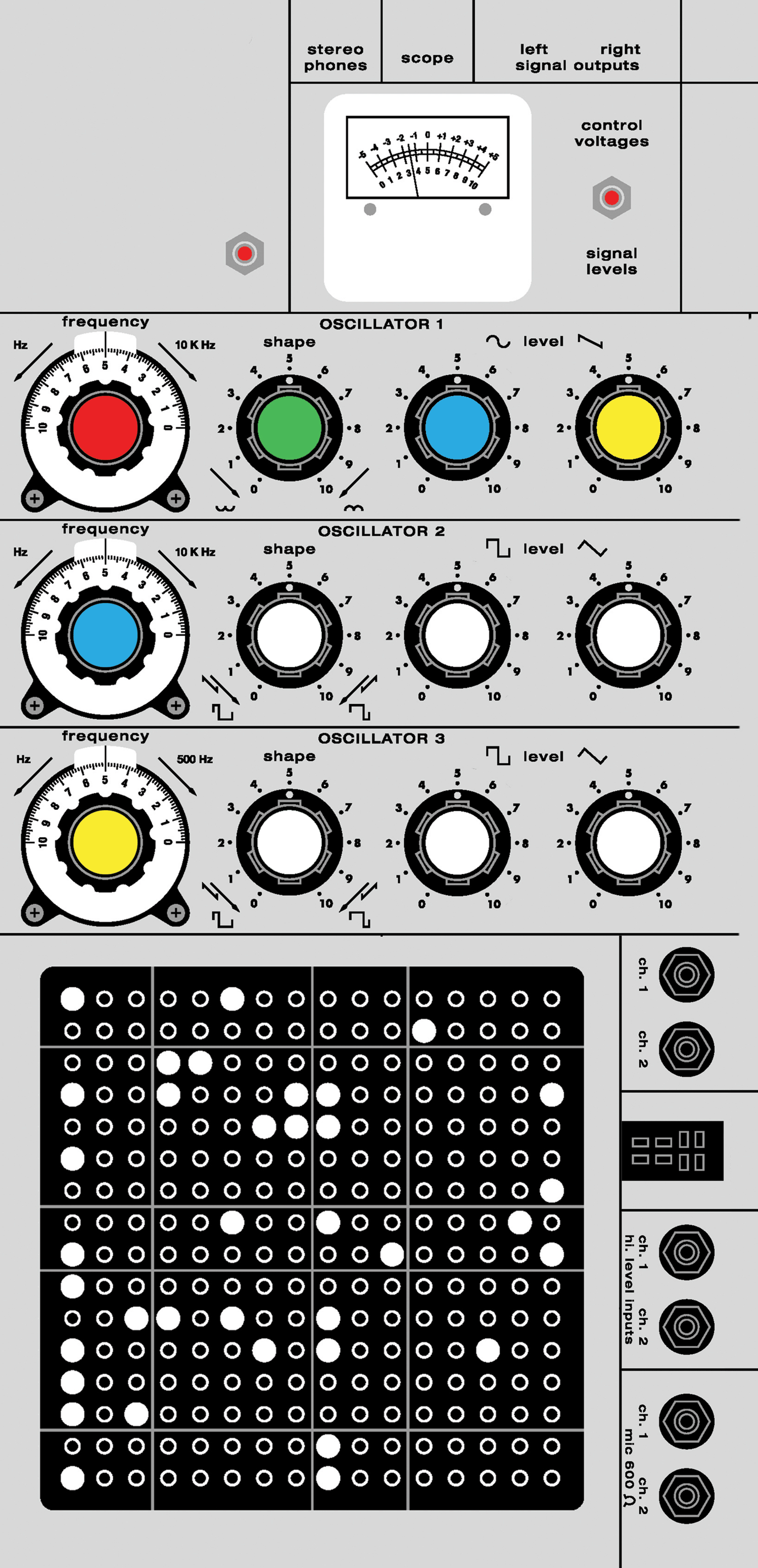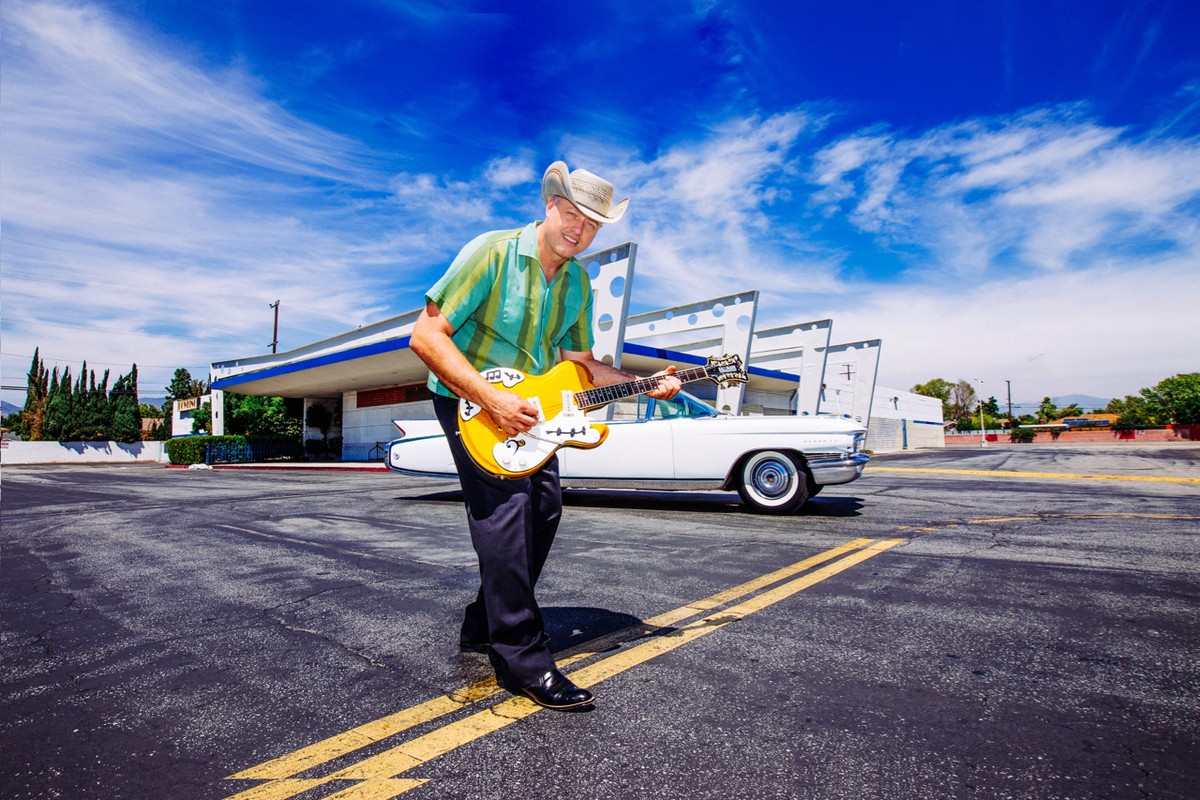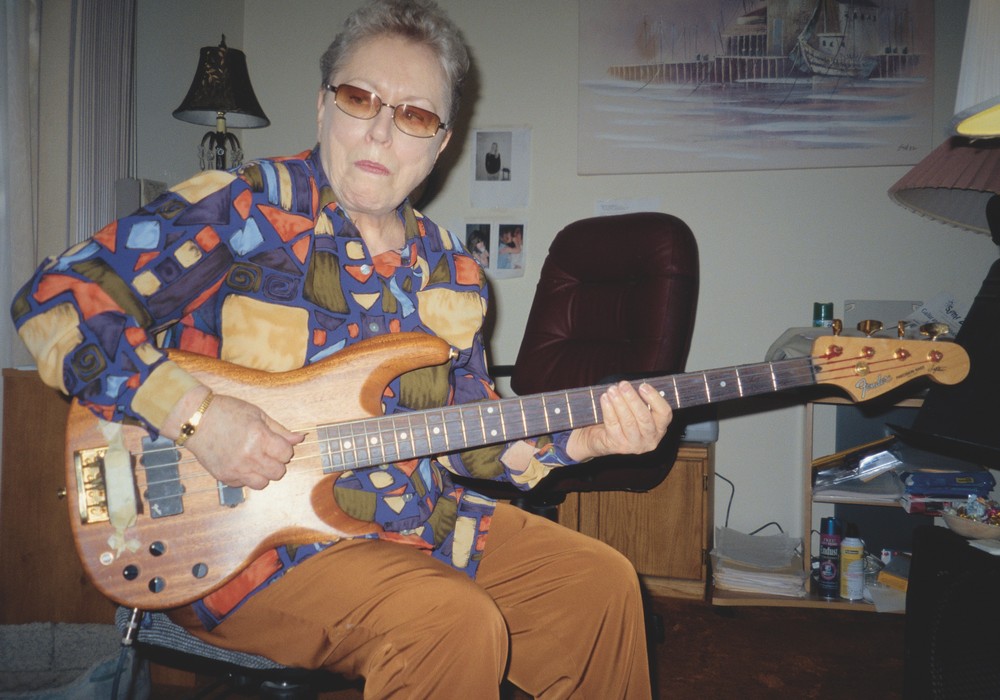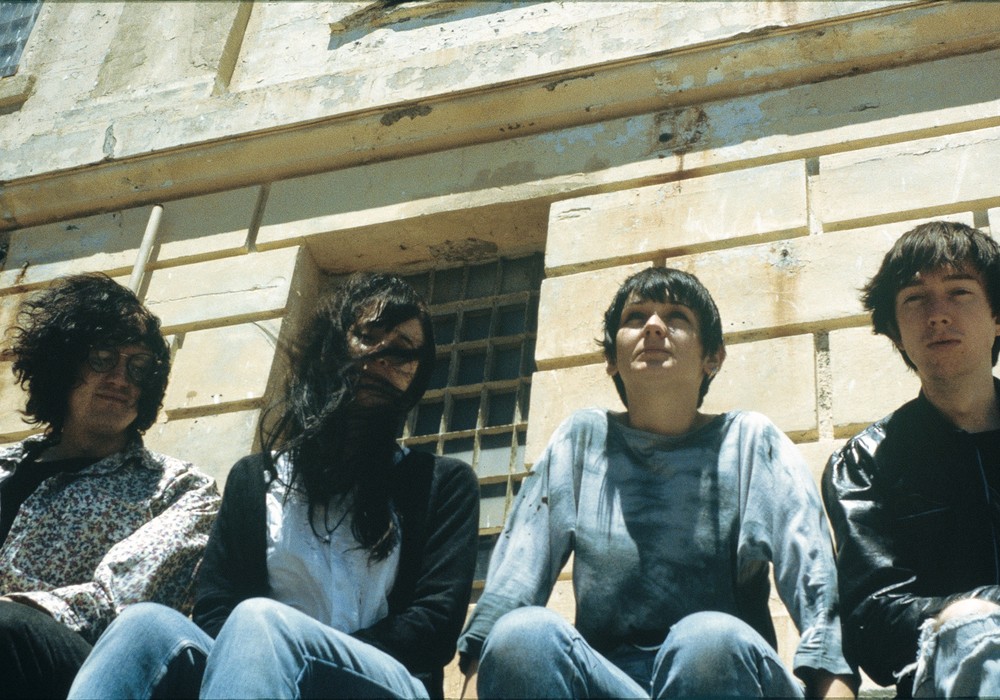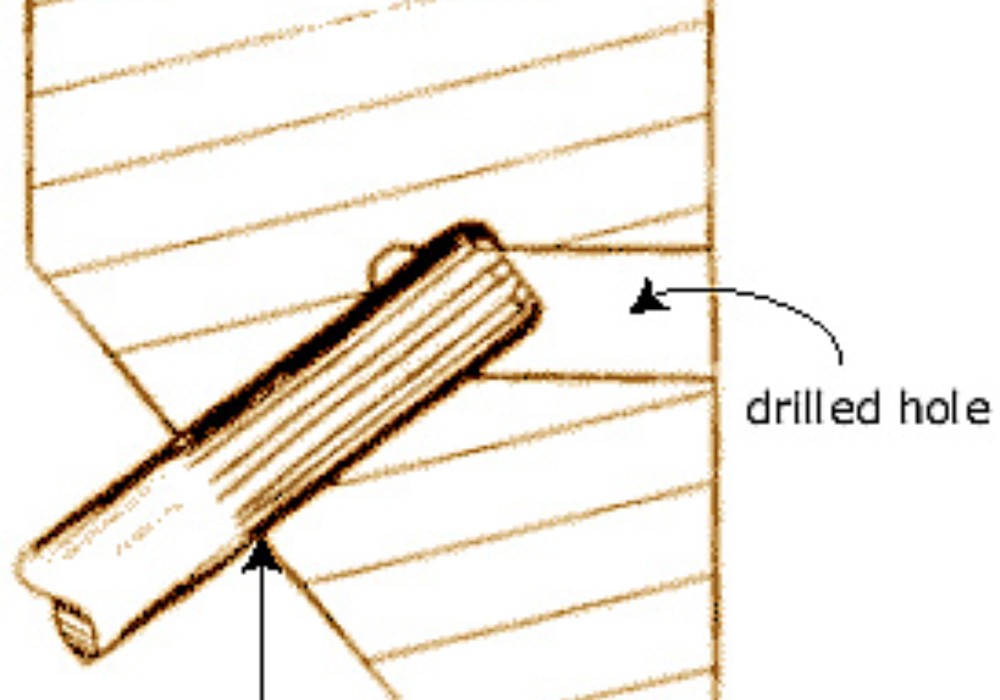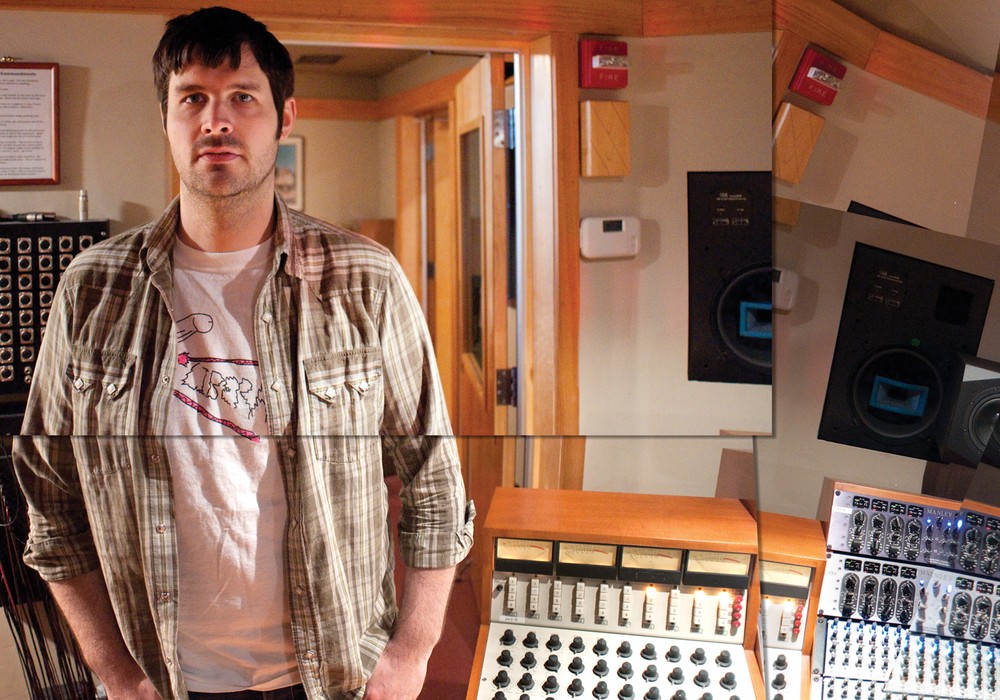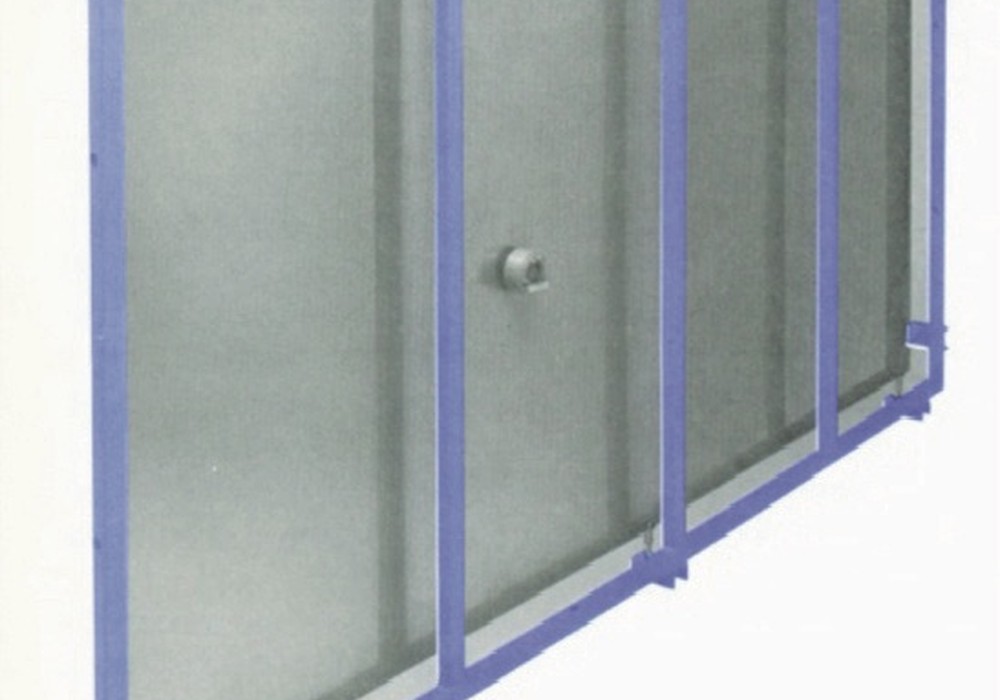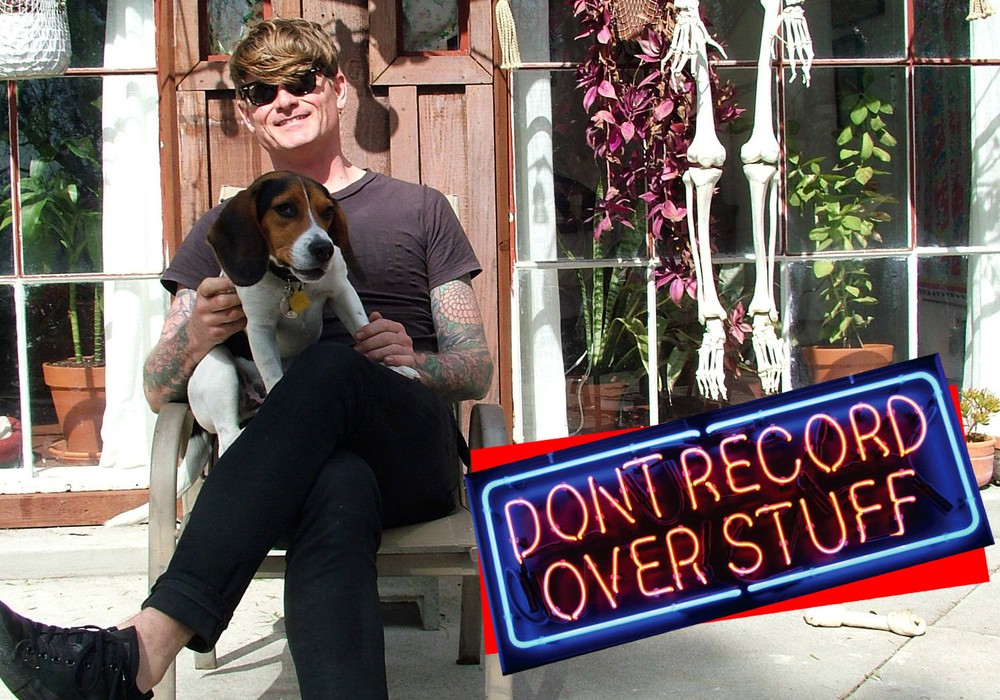A collector of guitars. Owner of Major Label and Ecco-Fonic Records. Record producer and engineer at his Ecco-Fonic Studios. Band leader. Guitarist. Author of two volumes of The Strat in the Attic. This guy, Deke Dickerson, does a lot of things. We met up for breakfast on a rainy Portland morning and, at the end of our interview, what did we do but to head downtown to look for the plaque (at 411 SW 13th Avenue) where The Kingsmen recorded "Louie Louie!" How appropriate.
You grew up in Missouri. We had an interview with Lou Whitney in issue #98. I know you were in different cities, I think...
I knew those guys, and they were my heroes, but they were just a lot older than me. When The Morells played their last show in 1984 I would have been 15 or 16 years old, and I was standing outside the club, on my tiptoes peering in the windows, watching them play their last show. I wound up getting the set list from their last show. Those guys were a huge influence, but they were also kind of these scary older guys to me. I think it was in 1990 that the Untamed Youth actually recorded a record at Lou Whitney's.
Column One?
Yeah, with their drummer, Bobby Lloyd Hicks. He played drums for us, because our drummer had just quit. We actually got Donnie Thompson to play second guitar on a song with me. I idolized those guys.
Lou seemed like — minded.
Definitely. When I was 15, or maybe 16, The Morells had broken up and they had a spin — off band called Maralie and Her Boys. It was Lou's wife Maralie on keyboard. They asked me to join the band while I was still in high school. I went down to Springfield for a week and rehearsed with her and a couple of other guys. She took me by Lou's place, and it was so funny, because I idolized Lou Whitney. He said, "Let me give you the best advice I could possibly give you. Get out of the music business now, while you still can!"
That shows up in his interview, too. "Become a lawyer. Do anything else."
At the time I was like, "Wow, man that guy's really cynical." Now here I am at 45 years old, probably the same age he was when he told me that, and I'm like, "That was probably the best advice I ever got."
I think you're sort of a brand, and people recognize that if you're presenting a show, or putting together a band, or your name's listed, there's something identifiable. I think that people who follow that support it, too.
Absolutely. I think a lot of (for lack of a better term) cult musicians build up that brand over time. You just have to make sure that if you attach your brand to something, you're going to deliver what people are expecting, and it's not going to suck.
Do you ever feel it's limited? I imagine that any musician's taste is wider than what the artist expects of them. Do you feel like sometimes you'd like to do completely different stuff?
Well, I feel like I do. I feel like I challenge my audience to like different things. Actually when you listen to this EP I did with Nikki Hill [Soul Meets Country!], it's like a soul — funk record. I was worried that a lot of the rockabilly people wouldn't get into it, but luckily Nikki Hill has really kind of blown up over the last year, and people love her. It's mostly been really positive feedback on it. I'm more interested in doing stuff that interests me. I guess if there's a comparison, it would sort of be Neil Young, a guy who does all these weird projects and sort of invites the audience to follow along with him. It's like, "Hey man, if you like me, then you should like this. If you don't, give it a couple of listens, and I bet you will like it." It's sort of a different career path than like The Ramones, who did 31 albums of the exact same sound.
feel like anybody worth their salt's going to be drawing a bunch of different genres and styles.
I sort of get identified as a rockabilly guy, but it's funny because rockabilly is just a tiny slice of what I do. But once you get the tattoo of rockabilly on your career, it's like you can never shake it. I've done all these different projects, and I could do an avant — garde experimental record, but people would still call me rockabilly. I just roll with it. A lot of people who pigeonhole people are like the least knowledgeable ones. My favorite example of that was when I did this record with Biller and Wakefield, this steel guitar combo. They were just fantastic sort of Western swing/jazz musicians. I recorded six songs with them, just straight live — to — mono tape. It was great. It sounded like a 1952 recording. They were going to do a record on HighTone, and the guy from HighTone records said, "Look, the playing is great on this, but I can't put out a mono record. You have to put out a stereo record." I said, "Okay, well if we're going to get an advance, I'll record this record in stereo for you." Basically what I did was the exact same recording, using RCA ribbon mics and everything else. I just recorded it to stereo with stuff slightly panned. When I played it for him, he's like, "No, this sounds old! I need it to sound stereo!" To him, the term stereo meant new, radio — friendly, modern. I was like, "Oh, I thought stereo meant that there's stuff in the left and the right speaker that's different." Yeah, the people who always want to pigeonhole you as retro or whatever usually know so little about what it is they're putting down.
Have you ever had to take someone who's been making records for a long time and convince them to try to make them the way that they were made in the old days?
Well, the thing about legacy artists, as you put it (I usually call them old — timers), is that even though they did great stuff in the '40s or '60s or '70s, they've also lived through subsequent decades, changed their equipment, bought different clothes, had different cars, had kids, wound up being insurance agents for a while, or whatever, so they don't have a direct timeline to that flash of brilliance that they had in 1956 or 1964 or whatever. A lot of times the younger kids who listen to those old records will think that's the flash of brilliance and everything about it is great. Nokie Edwards [The Ventures] is a good example, in that Nokie's heart really, truly lies with very gentle, acoustic finger — picking music. When he does that, he's great. He'll play songs like "Classical Gas," and it's brilliant. That's truly where his heart lies. He does realize but he doesn't love as much the fact that what most people like about Nokie was this violent, raw electric guitar that he played with The Ventures in the mid — '60s. If you point him in that direction, he'll do it, and it'll be great. It's just that you really have to say, "Okay, we're going to do this, and we want it to sound like this." He might try to turn the volume down and make it plainer — sounding, and you'll tell him, "No man, it's got to be up." At the end of the day, when you get an older artist in there with the right direction, it's brilliant. It's just that sometimes it can be so hard to get to that point. In some ways I can relate to it, because if somebody came to me and said, "That first Untamed Youth record was brilliant, and I want to take you in the studio and redo everything just like that," I'd be thinking in my mind like, "Oh man, it was a Tascam 8 — track recorder, AKG 414s on everything... I hate the way that record sounds. I don't want that!" So I understand. I also don't think I'm capable of going back and playing everything as fast and sort of crazy as I did when I was 17. But at the same time, I like to think that I understand why people would like that. I'd be fairly resistant to recreating my first recording in 1988.
I noticed one of the records you did was a live one from Portland, Live at Duff's Garage. What recording set — up was that?
It was an [Alesis] HD24 that we rented. This is sort of your nightmare story about digital recording. We did a Friday and Saturday night at Duff's. It was myself and this band The Modern Sounds. The guy who was engineering it was the drummer of The Modern Sounds, Alex Hall. I don't know if you know the name, but he has a studio in Chicago, and he recorded this really amazing record by J. D. McPherson. He set up this whole recording setup in the upstairs sound booth at Duff's. He had the HD24 going. We basically set it to record and played our show. The Friday night show was by far the best show that we'd every played in our lives. There was an amazing crowd response. After we played, we all said to ourselves, "That's it, man. This is killer!" Alex went up to the sound booth, and when he came back he was white as a ghost. The owner of Duff's had gone up there, as was his normal nighttime routine, and unplugged the power strip from the wall. The HD24 was still going in record, and when he did that, it was all gone. We found out later that we probably could have saved that, but we didn't know that at the time. We spent the next day being super depressed about losing the Friday night show. The Saturday night show is very good. It's a good CD, and I'm proud of it, but for those of us in the band, we know that the Friday night show was 25 percent better. That was one of those times that I wished I was just recording to tape.
Everything would still be there. Man, I waited years to delve into digital recording. I saw the ADATs come around, and everybody was building studios around those in the late '80s and early '90s. It seemed like if a studio was good, they kind of negated them, but if someone was bad, everyone would blame the ADATs. When I started Jackpot!, I got a 16 — track 2 — inch. Everybody said that tape sounded so much better. I let them believe that, but I just didn't want to fuck up the signal path. It took me years to get into the DAW stuff.
You're probably like me. It just doesn't feel cool. You feel cool when you're on an old board and working with the tape machine and all that, but now when you're working with a mouse, you just don't feel cool.
I've gotten used to it. Have you spliced tape in front of a younger band these days? It's a trip. They freak out.
They can't believe that it's possible. Have you ever heard the weird digital re — pressing of "She Loves You" by The Beatles? I heard it on a 7 — inch record at Len Horowitz's house. It was one of these vinyl records they put out in the late — '80s/early — '90s using a digital source. It was awesome, because there was actually a little digital crunch sound every time there was a tape splice. You actually realized that wow, these records have like 37 tape splices in them. "She Loves You" literally had a splice after each "She loves you yeah, yeah, yeah." A lot of those old hit records were done in seven or eight takes with a guy who really knew what he was doing, basically doing the old — timey equivalent of cutting and pasting on Pro Tools.
There's always been a lot of technical work in the background of records.
I appreciate a lot of different things. Just the other day, I was listening to "A Change is Gonna Come" by Sam Cooke, and I was thinking it was one of the most gorgeous recordings I'd ever heard. It was RCA Studios Hollywood, all the top guys. The level of engineering expertise and equipment available, with all [Neumann] U 47s and everything else, was literally the best that ever was. Then at the same time, I listened to some Jack Earls record on Sun, and it's really, marvelously screwed up in a fantastic way. If it were recorded at RCA studios with a bunch of U 47s and the same musicians, it would have been a terrible Jack Earls record. He needed to drink some moonshine and cut loose.
It's always what's appropriate. I have the hardest time explaining that to people sometimes.
I've had that a lot too, especially with rockabilly bands that just think that old microphones and a tape machine will make them magically sound better. It doesn't.
Do you find when you're producing people that you try to get people to change out amps and stuff?
Sometimes. Obviously if you're recording a dude and he's playing his guitar and his amp, you want to see if he's got something special going on. Sometimes, like this guy here in town, Ian Miller, he's got this cheap Squier Tele, like the crappiest Telecaster you can buy, and he gets the best sound out of it.
And those plastic Danelectro pedals that he's using lately.
He sounds great, you know what I mean? Recording him was a joy, because he's such a good musician and he knew how to get a sound out of his gear. But other guys, even some older guys who have been playing for a long time, will show up with a Roland Jazz Chorus amp. I just tell them there's no way I can get that to sound like a '50s or '60s record. It's going to sound like a Roland Jazz Chorus no matter what you do. Then we'll try to switch it out and get something that's a little more appropriate.
Do you find that sometimes people are fixated on gear they bring in that isn't actually working that well? I've had people who have brought in amps with blown out cones, blown out tubes, or microphonic tubes, issues they don't even hear.
I think people are way too fixated on gear period. I'm a guitar geek, and I love gear and all kinds of strange and obscure stuff, but if you can't play it, it doesn't make any difference at all. Another thing I learned just by watching Mark Neil record is that he'll walk around the room and just put his ear right on the guitar, or a bass, or a guitar amp speaker. It's amazing how different stuff sounds when you're across the room, or in a control room, compared to what's actually coming out of the instrument or the amplifier.
That's so important. I feel like I'm on a lifelong quest to explain that to people.
Well, nobody ever wants to believe that they're not good enough, or that their guitar sucks or whatever. It's like we were talking about earlier. It's a lifelong thing for me to sort of ride that line between, "Is this creative in an f — ed up way, or is this just bad?"
It's hard. You have to be the music critic for a moment to figure out where things need to go. That's true. It's a funny part of the job. So what do you have coming up in the future recording — wise?
After I did this four song EP with The Trashmen, it turned out really good, and people were super — excited about it.
Is that coming out on your label?
It already came out. I put it out as a 7 — inch four song EP and then as just a download, but everybody liked it so much that I went back and recorded some more stuff with them. It's called Bringing Back the Trash, by Deke Dickerson & The Trashmen. For me, I love The Trashmen, and people like to identify them as a one — hit — wonder novelty record band, but if you're into surf music, Tony Andreason of The Trashmen I think is like the great underrated surf guitar player. He still plays great. There are a bunch of songs on this new record where he'd go off on some solo, and you could see him just getting lost in it. It was like magic happening right in front of my eyes. For me, as a fan and also as a guy thrilled to play with The Trashmen, it's a super — exciting project to come out.
What places have you worked at recently?
In the last year or two I've done several projects down in Culver City at Pete Curry's studio. Pete Curry is the bass player for Los Straitjackets, and he built his own studio that he calls the Pow Wow Fun Room. I've done a lot of projects there, where I record drums and everything there and take it back to my house and do the vocal overdubs, mixing, and everything else.
You've worked with Duane Eddy, too?
I have. I had him do a guest track on my new CD, and that was the sort of deal where I sent out some digital tracks and he overdubbed it in Nashville and sent them back. It turned out really well. I wasn't familiar with the studio guy he hired, but it was awesome. One of the things I was wanting to talk to you about was recording upright bass. It's really hard, because even really good players will come in and play, and it'll have a very uneven response, even if they have a pretty good bass. I know I'm quoting him a lot here, but I give credit where it's due. One of the things Mark Neil told me was that none of these bass players now can play. He wound up using an EV — 666 with the bass player on my records, which is a pretty good microphone to use on a bass player with a really uneven response, because it kind of has that punchy low — mid thing going on, and it doesn't have a lot of proximity effect, so a bass player can be moving around a bunch and not playing very well, but you'll still get a usable bass track off it. Mark told me about Bob Moore in Nashville, who was like the guy who played on 5,000 records. I always knew Bob played on all these records, but I had this lightning — bolt experience when I was hanging out in Nashville with him and his wife Kittra and we went down to the Bluegrass Inn to see a band called The Time Jumpers play. They were like a Western swing band. Their bass player was very good. The guy playing with The Time Jumpers was an excellent bass player, but it's an upright bass. Certain notes come out louder than others, and it's an uneven response. Then they got Bob Moore up to play a couple of songs. Bob didn't touch anything on the amp, didn't change anything on the bass, and all of a sudden the bass was just amazing. Every note was exactly the same volume. Then you realized that it was in his hands. That's the reason why that guy was on 5,000 recordings. He just has a magic touch. Sometimes for that sort of thing, you just have to understand that there really is a magic touch to be had, and no amount of gear is going to change that. A lot of guys, especially when they're dealing with this older roots music, acoustic — type stuff, really don't understand that having a certain feel with your instrument is way more important than the type of instrument, how you record it, or anything else.
Oh yeah. It starts there, in the hands, the practice, the experience.
Yep. I've talked to a few of the other guys in Nashville about Bob Moore, and they said yeah, in that day, he was the only guy who could really make a professional bass recording, because that was the way he played. You're listening to some of the other recordings of other guys, and you hear the same deal, uneven response.
